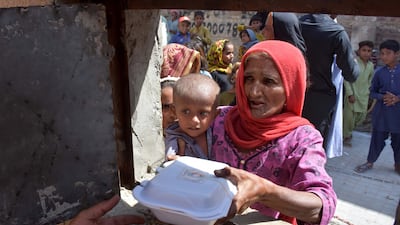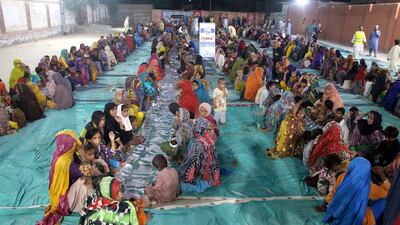Nobel laureate and education activist Malala Yousafzai landed in Pakistan on Tuesday to visit areas devastated by recent flooding, her father Ziauddin Yousafzai told The National.
“This is not our first time in Pakistan after we left. It's our second time. We came to Pakistan in 2018 and now we're here to meet the flood-affected people of Pakistan,” he said on Tuesday.
The return to her home country comes a few days after the 10th anniversary of the day the Pakistani Taliban shot her for insisting on her right to education.
It comes as thousands of people protested in north-west Pakistan on Tuesday after a gunman opened fire on a school van, killing the driver and critically injuring a child on Monday in Mingora — the city where Malala was shot.
Malala is expected to visit areas hit by devastating floods that have affected 33 million people and caused more than $30 billion in damage to the economy — or more than 10 per cent of gross domestic product.
The country must repair or replace two million damaged or destroyed homes, close to 24,000 schools, about 1,500 health centres and 13,000 kilometres of roads.
Scientific analysis found that climate change probably made the flooding worse, the World Weather Attribution group said. Pakistan is thought to have contributed only 0.8 per cent to the world’s emissions of fossil fuels.
Malala is expected to announce assistance from the Malala Fund for those affected by the flooding, Pakistan’s GEO news reported.
In the immediate wake of the flooding, the fund announced money to help provide emergency education services to ensure girls did not drop out of schooling, as well as psychosocial support to women and girls in flood-hit areas.
The is the second time Malala, who is accompanied by her parents, has returned to the country since the attack in 2012.
The 2012 attack, when Malala was only 15, drew international attention to the plight of women and girls in the country.
She became the youngest recipient of the Nobel Peace Prize at the age of 17 in 2014 and was held up as a symbol of resistance.
However, women’s rights and girls’ access to education has been limited.
Monday's van attack in Mingora sparked fears of a resurgence in militant activity in the Swat Valley.
The Swat Valley was the focus of a months-long army offensive in 2009 to remove militants from the area, but the operation also displaced hundreds of thousands of people.
Political activists, members of civil society and members of the public thronged to Mingora’s main intersection, chanting slogans denouncing the attack. The mass protest brought the city to a standstill, with businesses and markets closing in solidarity.
Protesters demanded the immediate arrest of the attackers and for peace and order to be restored. One placard read: “We cannot let the hard earned peace be destroyed”, while another said: “Act now against the attackers before it becomes too late”.




























